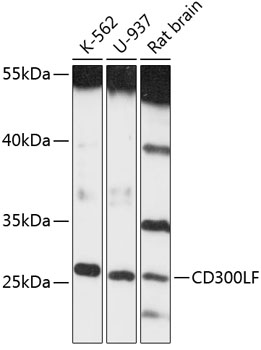-
Product Name
CD300LF Polyclonal Antibody
- Documents
-
Description
Polyclonal antibody to CD300LF
-
Tested applications
WB
-
Species reactivity
Human, Mouse, Rat
-
Alternative names
CD300LF antibody; CD300f antibody; CLM-1 antibody; CLM1 antibody; IREM-1 antibody; IREM1 antibody; IgSF13 antibody; LMIR3 antibody; NKIR antibody; CMRF35-like molecule 1 antibody
-
Isotype
Rabbit IgG
-
Preparation
Antigen: Recombinant fusion protein containing a sequence corresponding to amino acids 23-150 of human CD300LF (NP_001276011.1).
-
Clonality
Polyclonal
-
Formulation
PBS with 0.02% sodium azide, 50% glycerol, pH7.3.
-
Storage instructions
Store at -20℃. Avoid freeze / thaw cycles.
-
Applications
WB 1:500 - 1:2000
-
Validations

Western blot - CD300LF Polyclonal Antibody
Western blot analysis of extracts of various cell lines, using CD300LF antibody at 1:3000 dilution.Secondary antibody: HRP Goat Anti-Rabbit IgG (H+L) at 1:10000 dilution.Lysates/proteins: 25ug per lane.Blocking buffer: 3% nonfat dry milk in TBST.Detection: ECL Basic Kit .Exposure time: 90s.
-
Background
Acts as an inhibitory receptor for myeloid cells and mast cells. Positively regulates the phagocytosis of apoptotic cells (efferocytosis) via phosphatidylserine (PS) recognition; recognizes and binds PS as a ligand which is expressed on the surface of apoptotic cells. Plays an important role in the maintenance of immune homeostasis, by promoting macrophage-mediated efferocytosis and by inhibiting dendritic cell-mediated efferocytosis (By similarity). Negatively regulates Fc epsilon receptor-dependent mast cell activation and allergic responses via binding to ceramide and sphingomyelin which act as ligands. May act as a coreceptor for interleukin 4 (IL-4). Associates with and regulates IL-4 receptor alpha-mediated responses by augmenting IL-4- and IL-13-induced signaling (By similarity). Negatively regulates the Toll-like receptor (TLR) signaling mediated by MYD88 and TRIF through activation of PTPN6/SHP-1 and PTPN11/SHP-2. Inhibits osteoclast formation. Induces macrophage cell death upon engagement (By similarity).
Related Products / Services
Please note: All products are "FOR RESEARCH USE ONLY AND ARE NOT INTENDED FOR DIAGNOSTIC OR THERAPEUTIC USE"
